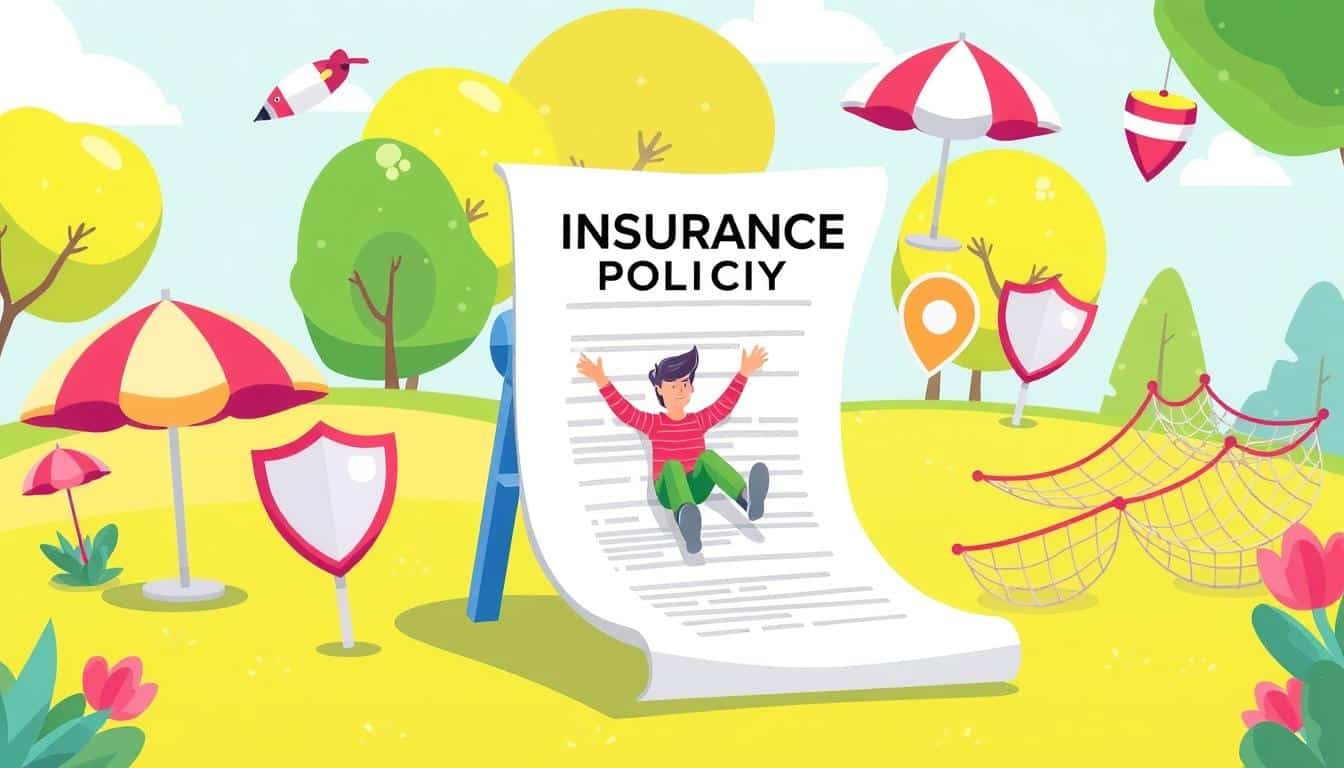Insurance: Sliding in Insurance: Risks & Tips | Stay Protected-2025
Ever thought about the hidden dangers in the insurance world? Sliding is a sneaky practice where people hide or lie about their info to get cheaper insurance.
But what is sliding, and how can you avoid its dangers? This article will explore the legal, financial, and moral sides of sliding. We’ll also share tips to keep your insurance strong and reliable.
Key Takeaways
- Sliding in insurance means hiding or lying to get lower premiums.
- It can cause legal problems, financial losses, and moral issues for both sides.
- Knowing the risks and following rules is key to keeping your coverage safe.
- Assessing risks, customizing policies, and regularly checking them can help you save money while staying within the law.
- Insurance agents are important for fair practices and helping you navigate the insurance world.
Understanding Sliding in Insurance
In the insurance world, “sliding” means giving wrong or incomplete info when applying. It’s done to get lower premiums. But, it can lead to big legal and financial problems for those who do it.
Also Read: Workers Compensation Insurance AUPEO: What Is It?
What is Sliding in Insurance?
Sliding in insurance means lying about personal details, health, driving history, or other things to get cheaper premiums. This can include not telling the truth about income, hiding health issues, or making up stories about driving or claims.
Common Practices and Motivations
- Underreporting income to qualify for lower premium rates
- Hiding pre-existing medical conditions to avoid higher health insurance costs
- Falsifying information about vehicle usage or claims history to obtain lower auto insurance premiums
- Manipulating underwriting data to optimize policy rates and coverage
The main reason for sliding is to optimize premiums and cut down on insurance costs. But, this can be seen as policy rate evasion. It can also cause serious legal and financial consequences for the person doing it.
“Sliding in insurance is a deceptive practice that can have far-reaching consequences. It’s important for policyholders to understand the risks and maintain transparency with their insurance providers.”
Knowing about sliding and why people do it is key. It helps consumers make smart choices and avoid the dangers of this practice.
Risks of Sliding in Insurance
Sliding in insurance is a risky practice with big legal, regulatory, and financial dangers. It’s important for both policyholders and insurance pros to know these risks.
Legal and Regulatory Consequences
Sliding means lying on an insurance application. It’s seen as insurance fraud, a serious crime. You could face big fines, lose your policy, or even go to jail.
Regulators are tough on this. They can fine you, take away your license, and harm your career.
Also Read: Arizona Insurance Annuity Protection: Your Safety Net.
Financial Implications
Sliding also has big financial risks. If caught, your insurance might not cover you. This means you could have to pay a lot of money yourself.
Also, your insurance rates might go up. Insurers try to make up for the risk they took on because of your lies.
| Consequence | Description |
|---|---|
| Legal Consequences | Insurance fraud, fines, policy cancellation, and potential jail time |
| Regulatory Consequences | Penalties, license revocation, and damaged professional reputation |
| Financial Implications | Denied claims, coverage gaps, and higher premiums |
The dangers of sliding in insurance are much bigger than any quick gain. Always be truthful when applying for insurance. This way, you get the right coverage and avoid legal, regulatory, and financial problems.
Sliding in Insurance: Risks & Tips
In the world of insurance, “sliding” can be very risky. It means hiding or lying about information to get a lower premium. This might seem like a quick way to save money, but it can cause big problems later on.
One big risk of sliding is facing legal trouble. Lying on an insurance application is fraud, which is a crime. If caught, you could get fined, have to pay for lawyers, or even go to jail. Insurance companies might also cancel your policy or not pay claims, leaving you in a tough spot.
Sliding can also hurt your wallet. If your policy is based on wrong information, you might not have enough coverage. This means you could have to pay for big claims yourself. Plus, if you’re caught sliding, you might have to pay more for insurance or even can’t get any at all.
Tips for Avoiding the Pitfalls of Sliding
- Prioritize transparency: Always provide accurate and complete information when applying for or renewing an insurance policy.
- Resist the temptation of premium optimization: Avoid manipulating policy details to lower your rates, as this can backfire with serious consequences.
- Seek professional guidance: Consult with a reputable insurance agent or broker who can help you navigate the complexities of policy selection and customization.
- Review policies regularly: Regularly review your coverage to ensure it meets your evolving needs and that you are not inadvertently underinsured.
By knowing the risks of sliding and following these tips, you can avoid legal and financial problems. This way, you can make sure you have the right coverage to keep you safe.
Ethical Practices in Insurance
In the insurance world, being ethical is key. It’s important to be open and honest when applying for insurance. This builds trust and makes sure people get the coverage they need. Both agents and customers must act with integrity to keep the industry’s good name and protect everyone’s interests.
Transparency and Disclosure
Insurance agents need to share all the details about policies and any possible conflicts. Customers should give honest and full information when applying. Being open helps avoid problems like “sliding,” where important facts are left out or wrong, causing gaps in coverage.
Maintaining Professional Integrity
- Agents should follow industry rules and keep learning about new laws and best ways to do things.
- Customers must tell the truth about their risks and needs, even if it means paying more.
- Everyone should work together to make sure the policy covers what’s needed, without losing sight of ethical practices, transparency, or professional integrity.
By focusing on ethical practices, transparency, and disclosure, the insurance field can earn trust, offer right coverage, and steer clear of sliding or other bad acts that hurt professional integrity.
State Regulations and Industry Guidelines
The insurance world is filled with rules from states and the industry itself. These rules cover how to act ethically, handle policies, and deal with claims. Knowing these rules is key for insurers and those who buy insurance to stay out of trouble.
Insurance laws differ from state to state. They cover things like who can sell insurance, how rates are set, and what’s in a policy. Insurers must follow these laws to be fair and legal.
The industry also has industry guidelines to keep things honest and clear. These rules, made by groups like the National Association of Insurance Commissioners (NAIC), help with:
- Telling policy terms and limits clearly
- Being fair when deciding who gets coverage and how much
- Handling conflicts of interest right
- Keeping policyholder info safe
Following these industry guidelines and state laws is crucial. It helps insurance pros stay on the right side of the law and keep the industry respected.
| Regulatory Framework | Key Provisions |
|---|---|
| State Insurance Regulations |
|
| Industry Guidelines |
|
By following the state regulations and industry guidelines, everyone in the insurance world can stay legal and ethical. This helps protect everyone’s interests.
Premium Optimization Strategies
Finding the right balance in insurance is tricky. It’s about getting enough coverage without spending too much. While some methods are not right, there are good ways to lower your insurance costs. By teaming up with your insurance agent, you can make sure you’re paying what you should, based on your risk.
Risk Assessment and Underwriting
The first step in lowering your premiums is a thorough risk assessment. Your agent will look at your driving record, claims history, and property details. This helps in setting premiums that match your risk level. By giving your agent all the facts, you can get the best coverage at a good price.
Policy Customization
Customizing your policy is another smart move. Your agent can help you adjust your coverage to fit your needs and budget. This means you can get the right amount of protection without overspending.
Being open and working with your agent is key to saving on insurance. Together, you can find a policy that’s both affordable and comprehensive. This way, you can have peace of mind without breaking the bank.
Closing Coverage Gaps
It’s vital to have complete and correct insurance coverage to protect yourself and your belongings. Underinsuring, or sliding, can create big gaps in coverage. This makes you more likely to face financial losses and risks without insurance. We’ll look at ways to find and fix these gaps through a detailed risk analysis and ongoing policy checks.
Comprehensive Risk Analysis
To start fixing coverage gaps, do a deep risk analysis. Look closely at your assets, debts, and possible risks. This helps you see where your insurance might not be enough. Then, you can make a plan to fill those gaps.
Continuous Policy Review
Your insurance needs can change, so it’s key to check your policies often. Make sure your coverage matches your current situation and risks. This way, you can avoid unexpected gaps in coverage and stay protected.
| Key Considerations for Closing Coverage Gaps | Recommended Approach |
|---|---|
| Asset Protection | Ensure adequate coverage for your home, vehicles, and other valuable possessions. |
| Liability Exposure | Review your liability limits to protect against lawsuits and legal claims. |
| Specialty Coverages | Evaluate the need for additional policies, such as flood, earthquake, or umbrella insurance. |
| Life and Health Protections | Maintain appropriate life, disability, and health insurance to safeguard your family. |
By doing a thorough risk analysis and always checking your insurance, you can find and fix coverage gaps. This ensures you’re well-protected against life’s surprises.
Agent Responsibilities and Best Practices
Insurance agents are key to keeping the industry honest and open. They act as trusted advisors, giving clients the right info and helping them choose the best coverage. They also follow important industry rules.
Agents must do a deep dive into each client’s needs. They look at what’s unique about each person and suggest the right coverage. They must share all important details, like policy specifics and what’s not covered, so clients can make smart choices.
- Provide accurate and transparent information to clients
- Guide clients towards appropriate insurance coverage
- Uphold industry guidelines and ethical practices
Agents also need to be professional and honest. They should keep learning, know the latest rules, and always act ethically. This way, they earn their clients’ trust and help make the insurance world better.
“The true test of an insurance agent’s character is not how they sell policies, but how they service them.”
When people work with honest and smart agents, they can feel sure about their insurance. It’s important for agents to do their job well and follow the best practices. This keeps the insurance industry strong and reliable.
Conclusion
This article has covered the key points about sliding in the insurance world. It showed the dangers and how to deal with them. We talked about the legal and financial issues of lying about information. It’s clear that being honest and open is key to a safe financial future.
Knowing how to manage premiums and avoid gaps in coverage is important. It helps people make smart choices and avoid problems. Being truthful and following the rules helps keep everyone safe and builds trust.
We’ve seen how sliding in insurance: risks & tips, policy rate evasion, premium optimization, coverage gaps, and ethical practices are all linked. A complete approach is needed. By following these principles, people and companies can feel secure in the insurance world. They can protect their finances from surprises.
FAQ
What is sliding in insurance?
Sliding in insurance means giving false information to get lower premiums. This can include lying about personal details, health, or driving history.
What are the legal and regulatory consequences of sliding in insurance?
Sliding is seen as insurance fraud, a serious crime. It can lead to fines, policy cancellation, or even jail. Regulators are strict, and breaking the rules can harm your career and reputation.
What are the financial implications of sliding in insurance?
Sliding can cause gaps in coverage and higher premiums later. It might also mean denied claims if the truth comes out. This can lead to financial losses if you’re not properly covered.
What are the ethical practices and responsibilities in the insurance industry?
Ethics are key in the insurance world. This means being honest and transparent when applying for insurance. Both agents and clients must act ethically to avoid misrepresentation.
What are the state regulations and industry guidelines that govern insurance practices?
The insurance field is ruled by many state laws and guidelines. Knowing these rules helps avoid legal and financial trouble from unethical actions.
What are the legitimate strategies for premium optimization?
There are honest ways to lower premiums. These include assessing risks well, accurate underwriting, and customizing policies. Working with your agent to find fair rates is important.
How can policyholders avoid coverage gaps?
To prevent gaps, do a thorough risk analysis and check your policies often. This keeps your coverage up to date, protecting you and your assets.
What are the responsibilities and best practices for insurance agents?
Agents must ensure practices are honest and clear. They should give correct info, help clients choose right coverage, and follow industry rules. Best practices include detailed risk assessments, full disclosure, and integrity.
Sajjad Hossain is an experienced writer on StatusCaption.xyz, specializing in insurance, business ideas, money management, and investment. With a passion for simplifying complex financial topics, [Author Name] provides clear and actionable insights to help readers make informed decisions in their financial journey. Committed to delivering expert advice and practical tips, Sajjad Hossain aims to empower readers to achieve their financial goals confidently and strategically.




